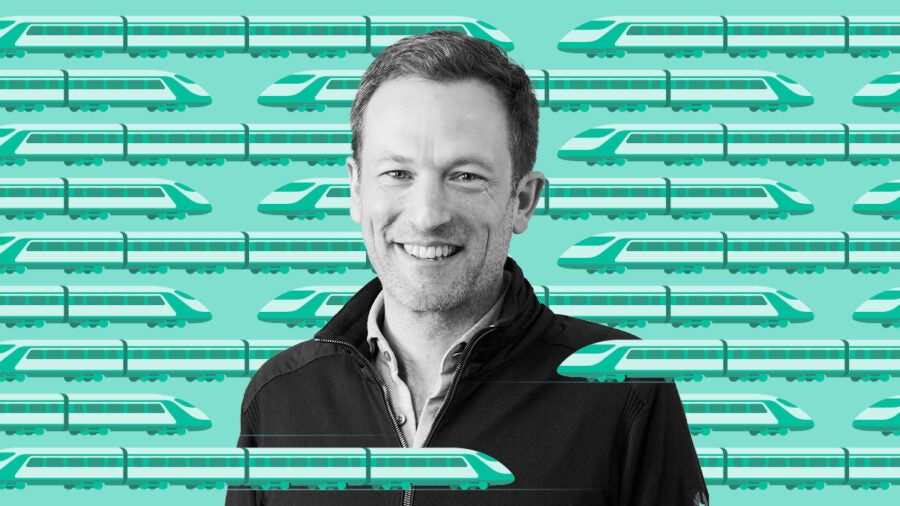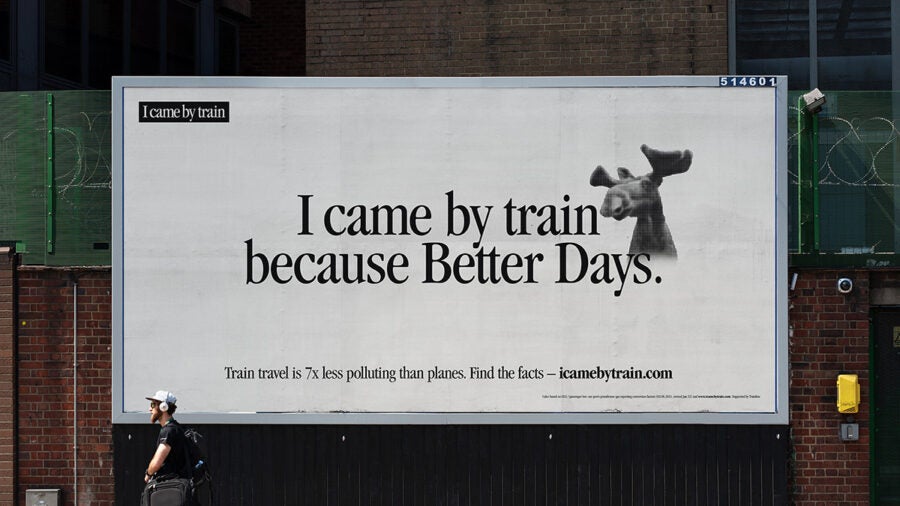
Jody Ford spends his working day thinking about rail services and how his company can make it easier for people to book them. Then he spends much of his time off travelling by train.
The CEO of Trainline recently took his family on a “railman’s holiday” comprising a 1,500-mile train journey from Seville to Vienna via Venice. The self-confessed train geek has also travelled extensively by rail in Europe with his colleagues, including the comparatively short run from Milan to Zurich – a jaunt he recommends for its route through the world’s longest railway tunnel as much as for the stunning scenery on both sides.
Jody Ford’s CV
A love of tech and trains has led Ford to the Trainline CEO role
2021- : CEO
2020-21: chief operating officer and CEO-designate
2019-20: non-executive director
2016-19: CEO
2015-16: vice-president, global growth
2012-15: vice-president, marketing, North America
2008-12: vice-president, managed marketplaces and verticals, EU
2006-08: marketplace director, UK
Before his interview with Raconteur on the French Riviera at the Cannes Lions International Festival of Creativity, Ford had travelled to nearby Nice by rail from a meeting in Paris and was already planning a return train to London. Such trips give him the chance to test out the technology his firm has developed at first hand, but he prefers this mode of transport anyway, particularly when it enables him to avoid the airport delays that seem to have become part of the festival experience for many attendees.
Ford’s interest in railways began at a tender age. His parents split up when he was young, obliging him to spend much of his childhood on trains running between Peterborough and Herne Hill in south London. When the chance to become CEO of Trainline came his way, he felt that the opportunity was too good to miss.
But this wasn’t the only compelling reason to join the company, says Ford, who recalls wanting at school to “work in computers and do the tech thing”. After starting his career in consulting, with stints at PwC and McKinsey, he built a strong reputation in corporate management at eBay, working his way up there over 10 years to become its vice-president of global growth in 2015.
At this point, Ford realised that he would like to become a CEO, because what he really relished was setting strategic goals and getting everyone pulling together towards them. So, when the opportunity presented itself, he moved to Photobox and Moonpig as CEO, where he stayed for four years, latterly as a non-executive director at Moonpig after it left the Photobox Group in 2019.
“I had a call from an old manager and mentor who asked me if I’d want to come and run Photobox,” he recalls. “I admit that, when I first became CEO, I thought: ‘This is quite hard!’ But, once I really got into the role, I loved it. I enjoy the responsibility but also the range of work. At Trainline, I get into the technical stuff on the app and I work on the commercial proposition. We do a lot of work on regulation and now I’m getting involved in politics, which I find fascinating.”
Taking control of a new firm in the pandemic
Ford joined Trainline, initially as chief operating officer and CEO-designate, six months into the Covid crisis. Despite the pandemic’s huge impact on rail travel, he was convinced that passenger numbers would recover strongly.
His confidence has not been misplaced. During the first quarter of this year, about 389 million rail passenger journeys were made in Great Britain, which equates to 88% of the total recorded in Q1 2019. Ford reports that, on some days this summer, rail usage has exceeded 2019 levels, mostly because of an uptick in domestic leisure travel.
Nonetheless, the Covid lockdowns of 2020-21 inevitably dented Trainline’s revenues and profitability. The firm’s share price slumped from £547 on 21 February 2020 to £225 a month later and it posted a £10m operating loss for the year to the end of February 2022. The business has since returned to the black, turning an operating profit of £28m in 2022-23, although the share price remains some way below its pre-pandemic peak.
When I first became CEO, I thought: ‘This is quite hard!’ But, once I really got into the role, I loved it
Given Covid’s impact on the business, a freeze on investment would have been an understandable response from its leadership team. But Trainline “leant into the disruption” instead, keeping its developers working on new products. Ford did the same, updating employees regularly on strategic developments and his own work via fortnightly videos that he still creates (although the backdrop has shifted from walks in his local park to new rail routes he’s trying out).
He believes that the videos have been more effective than emails in helping people get to know their CEO. They have also been easier for Ford – who has dyslexia – to produce than written communications.
“I used to send emails, but that would take me four days because I’d start wordsmithing them, checking them repeatedly and removing words that felt inappropriate,” he says. “Video is much better for me and it connects more deeply.”
Expanding the business internationally
Trainline was founded in 1997 by the Virgin Group before being acquired for £450m by private equity giant KKR, which floated the business in 2019 with a valuation approaching £2bn. Today, the FTSE 250 constituent has 32 million active users each month and sells tickets for 270 train operating companies in more than 40 countries.
Close cooperation with these firms is clearly central to its business model. In Spain, for instance, the market has expanded from a single rail company to four operators over the past 18 months, with Trainline working hard to ensure that it could sell their tickets to both Spanish and international customers as soon as these became available.
More competition of this nature is good for Trainline because it encourages customers to use the firm’s services to calculate the most cost-efficient travel options. Ford stresses that this is also good for consumers, because it brings down prices, and for the planet, because it encourages people to go by rail rather than fly. He claims that there has been a 29% reduction in air travel between Madrid and Barcelona since the expansion of Spain’s railway market.
That highlights Trainline’s goal of getting people out of cars and aircraft. Its recent marketing campaign, created by ad agency Mother London, uses the tagline “I came by train“ and focuses on the rail industry’s comparatively small carbon footprint. Spreading the sustainability message, Ford believes, will be key to the sector’s growth.

“People use Trainline because of our combination of value and ease, but that’s actually the way to get people to change their behaviour,” he says.
Europe, a market that’s five-and-a-half times larger than the UK, is where Trainline sees plenty of growth potential. The company has been prioritising expansion in Spain, Italy and France, although it sells tickets in several other countries. It has a share of about 6% in the biggest of these markets, but it wants to double that.
Moving into these new territories is not as simple as replicating its approach in the UK, of course. The business must learn how consumers use rail services in each market and tailor its offering to their needs while working with the relevant regulators.
The importance of data
Data is key to its success in this respect. The company, which appointed its first chief data officer 18 months ago, is using the wealth of material at its disposal to inform the development of new services. One example of this is the SplitSave feature, which enables users to buy two or more tickets covering sections of a single journey for a lower combined price than one ticket for the whole trip.
Ford also sees more potential to customise the user experience and the opportunity to provide high-quality tourist information to holidaymakers, particularly those coming to Europe from North America.
“We have users who might live in New York but are landing in London and flying out of Rome,” he explains. “What could we do to give them a route and places to see along the way? When people know what trips they want to make, we are amazing. Could we do more to inspire them to make such trips?”
In the UK, we have something of a love/hate relationship with the railways. The long-running campaign of industrial action by rail unions seeking better pay and conditions for staff has been frustrating for many regular train users, while the debate about renationalisation has moved back up the agenda since the government stripped FirstGroup of the TransPennine Express franchise in May. Despite this, Ford believes that the British take pride in travelling by train. He certainly does.
“I just think the story of rail is a great one and there’s still so much going on in terms of investment, liberalisation and sustainability. We’re really well positioned to help customers get the most out of it,” he says. “I feel very lucky, because I always think I know things [about this industry], then I go on a new trip and talk to people from the EU, the US or China about how they booked theirs and I find that there’s so much more to learn. I love it.”

Jody Ford spends his working day thinking about rail services and how his company can make it easier for people to book them. Then he spends much of his time off travelling by train.
The CEO of Trainline recently took his family on a “railman’s holiday” comprising a 1,500-mile train journey from Seville to Vienna via Venice. The self-confessed train geek has also travelled extensively by rail in Europe with his colleagues, including the comparatively short run from Milan to Zurich – a jaunt he recommends for its route through the world’s longest railway tunnel as much as for the stunning scenery on both sides.
Before his interview with Raconteur on the French Riviera at the Cannes Lions International Festival of Creativity, Ford had travelled to nearby Nice by rail from a meeting in Paris and was already planning a return train to London. Such trips give him the chance to test out the technology his firm has developed at first hand, but he prefers this mode of transport anyway, particularly when it enables him to avoid the airport delays that seem to have become part of the festival experience for many attendees.





